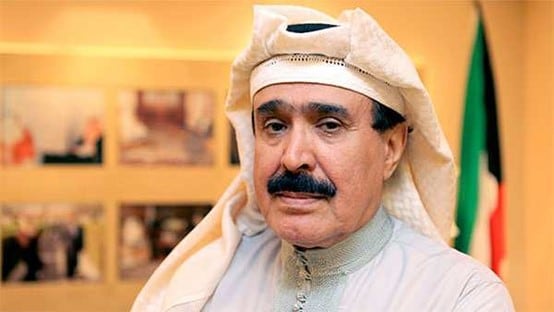In a November 2 article on the English-language Kuwaiti daily Arab Times, the daily's editor, Ahmed Al-Jarallah, states that Lebanon's problems do not stem from the presence of 19 different sects, each with its own religious laws and authorities. Rather, they stem from the fact that one faction – Hizbullah – has taken over the country with the ultimate goal of establishing the Islamic Republic of Lebanon, modeled on the Islamic Republic of Iran. To this end, he says, Hizbullah has turned Lebanon into a hotspot of terrorism, drug trafficking and sabotage. He concludes that, in light of this situation, the Arab states must form an international force to rescue Lebanon from this terrorist party; otherwise, this country will remain a threat to the security of the entire Arab world.

Ahmed Al-Jarallah (Source: Arab Times, Kuwait)
The following is his article.[1]
"The challenge in Lebanon is not the presence of 19 sects, each with a personal status law and religious reference. Rather, [Lebanon's] major challenge lies in the monopoly of a political faction over a sect and its quest to use this to dominate a highly sensitive country with fragile sectarian and political balances.
"This kind of dynamic quickly turns into militarization of sects [that are] linked to external religious references and have relations with fighting countries, which leads to [the] transfer of the problems of those countries to the Lebanese interior, and makes the conflict more complex.
"In 1975 when the balances were perturbed, the solution was supposed to come within the democratic system, but that did not happen. The Lebanese did not benefit from the experience of 1958 and the rehearsal they had of the civil war when the 'political Maronite' tried to align itself with Baghdad Pact, contrary to the desire of other political forces. In 1960s, the 'political Sunnis' also tried to align with the Pan-Arabism calls of Egypt’s Jamal Abdul-Nasser, and that was the beginning of the security skirmishes that ended in a civil war.
"At that time, the Arab countries did not stand by idly, fearing that the spark of war would reach them sooner or later, and therefore [that] a military intervention was necessary. This was the conclusion of the Riyadh Summit in 1976 which sent the “Arab Deterrence Forces”, the majority of which were from the Syrian army, grafted with symbolic Arabic formations.
"It is true that this intervention led to a truce for about two years, but an important development emerged in 1979, which is the success of the Khomeini revolution. The Mullah regime wanted to turn it into an expansionist project, and Tehran found Lebanon exhausted by its conflicts, prompting it to form an armed Shiite group. It was then that the 'political Shiites' entered the equation and the power-sharing parties, and advanced with the rest based on numerical strength.
"Here, it may be useful to refer to the words of the Arab Lebanese thinker Manah Al-Solh, which is the result of a realistic reading of Lebanon, as he said, “It is not important that there are 19 sects, but the real danger lies in the domination of one of them over the rest”.
"This hegemony emerged with Hezbollah’s use of arms and the Israeli withdrawal from South Lebanon in 2000, to control the state and implement its strategic project to establish the Islamic Republic of Lebanon on the model of the Islamic Republic of Iran, which is the main goal it announced in 1982 in its political statement.
"There is no doubt that the events that Lebanon witnessed in the past fifteen years, i.e., after the assassination of the martyr Rafik Hariri and his companions, were the natural preludes to laying hands on the country, either by threatening the Lebanese with its weapons, or intimidating politicians with assassination. This happened in the absence of a major political decision [allowing] the Lebanese army to stand up to it, and the absence of a regional political supporter such as Damascus, when it had the upper hand in restoring Lebanon’s internal balances, with Arab blessing.
"Unfortunately, the joy of the Lebanese [after] the withdrawal of the Syrian army from Lebanon in 2005 was short-lived. Hezbollah and the Persian Peacock arrogance regime quickly filled the security vacuum and made Lebanon a terrorist platform that frustrates the Arab countries, and to which plots of sabotage, drugs and calls for Shiism are exported.
"This fact obliges the Arabs concerned with the Lebanese affairs to direct the formation of an Arab-international force capable of eliminating this sectarian puppet gang that will not retreat from its expansionist plan unless it suffers a major defeat, and the dismantling of this terrorist party. Otherwise, Lebanon will remain a source of political and security concern for the Arab world."
[1] Arab Times (Kuwait), November 2, 2021. The text has been lightly edited for clarity.




